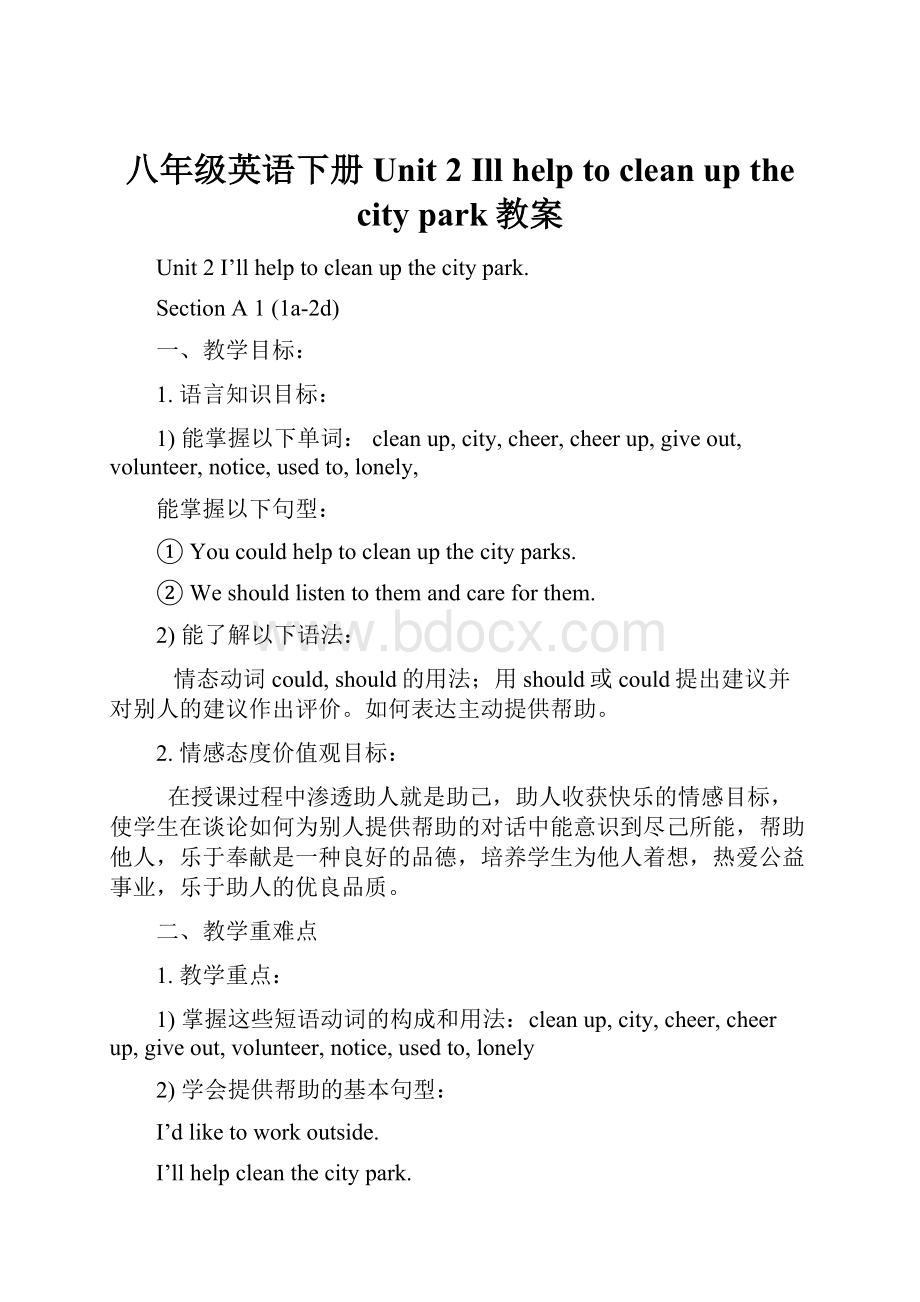八年级英语下册 Unit 2 Ill help to clean up the city park教案.docx
《八年级英语下册 Unit 2 Ill help to clean up the city park教案.docx》由会员分享,可在线阅读,更多相关《八年级英语下册 Unit 2 Ill help to clean up the city park教案.docx(31页珍藏版)》请在冰豆网上搜索。

八年级英语下册Unit2Illhelptocleanupthecitypark教案
Unit2I’llhelptocleanupthecitypark.
SectionA1(1a-2d)
一、教学目标:
1.语言知识目标:
1)能掌握以下单词:
cleanup,city,cheer,cheerup,giveout,volunteer,notice,usedto,lonely,
能掌握以下句型:
①Youcouldhelptocleanupthecityparks.
②Weshouldlistentothemandcareforthem.
2)能了解以下语法:
情态动词could,should的用法;用should或could提出建议并对别人的建议作出评价。
如何表达主动提供帮助。
2.情感态度价值观目标:
在授课过程中渗透助人就是助己,助人收获快乐的情感目标,使学生在谈论如何为别人提供帮助的对话中能意识到尽己所能,帮助他人,乐于奉献是一种良好的品德,培养学生为他人着想,热爱公益事业,乐于助人的优良品质。
二、教学重难点
1.教学重点:
1)掌握这些短语动词的构成和用法:
cleanup,city,cheer,cheerup,giveout,volunteer,notice,usedto,lonely
2)学会提供帮助的基本句型:
I’dliketoworkoutside.
I’llhelpcleanthecitypark.
Youcouldgiveoutfoodatafoodbank.
2.教学难点:
学会提供帮助的基本句型
三、教学过程
Step1Warmingup
1.播放学生志愿者进行义务帮助别人的活动视频,通过询问他们以下问题来引导学生们了解社会上一些的志愿们进行的活动。
T:
Whoarethey?
S:
They’revolunteers.Theyusuallyvolunteertohelpothers.
T:
Howcouldwehelppeople?
S1:
Wecouldcleanuptheparks
S2:
Wecouldhelpsickpeopleinthehospital.
S3:
Wecouldhelpplanttrees.
…
Step2Newwords
1.cityn.城市
e.g.Thelibraryisinthenorthofthecity.图书馆在城市的北部。
2.noticen.公告牌;通告;布告
e.g.Pleasereadthelistonthenoticeboard.请读公告板上的名单。
3.signn.标志;信号
e.g.Lookaround,wecouldseenosignoflife.
环顾四围,我们看不出一点生命的迹象。
4.volunteerv.义务劳动,自愿做volunteertodosth.义务自愿做某事
e.g.Manypeoplevolunteertoworkonthefarm.很多人志愿到农场去工作。
5.cleanup打扫;清除
e.g.Thestudentstaketurnstocleanuptheirclassroom.学生们轮流打扫教室。
6.giveout分发;散发
e.g.Pleasehelpmegiveoutthesetestpapers.请帮我将这些试卷发下去。
7.cheerv.欢呼;喝彩
e.g.Cheerup.Thenewsisn’ttoobad.振作起来,消息还不算太坏。
8.lonelyadj.孤独的;寂寞的
e.g.Idon’tfeellonelybecauseImadenewfriendshere.
我不觉得孤独因为我交了新朋友。
9.usedto曾经,过去
e.g.Jackusedtobeshort,butnowhe’stall.杰克过去很矮,但现在高了。
Step3Discussion
1.1a.Lookatthewaysyoucouldhelpothers.Thenlistotherways.
2.Ssdiscusswiththeirpartners
andwritethewaysonecouldhelpothers:
①Helptoplanttreesbytheriver.
②Helptocleanupthecitypark.
③Visittheoldpeopleintheoldpeople’shome.
④HelpyoungkidstolearnEnglish.
Step4Listening
1.T:
TellSstoreadthesentencesinthechart.Makesuretheyknowthemeaningofthesentences.
2.1b.PlaytherecordingfortheSstolistenandnumberthewaystheboyandgirlcouldhelpothers.
___Thegirlcouldvisitthesickkidsinthehospitaltocheerthemup.
___Theboycouldgiveoutfoodatthefoodbank.
___Thegirlcouldvolunteerinanafter-schoolstudyprogramtoteachkids.
___Theboycouldhelptocleanupthecityparks.
(Key:
3,2,4,1)
Step5Pairwork
1.LetSsreadtheconversationinthepicture.
2.1c.Usetheinformationinthechartof1btomakeotherconversations.
A:
Ihopetoworkoutside.
B:
Youcouldhelptocleanupthe
cityparks.
……
3.Letsomepairsactouttheirconversations.
Step6Listening
1.2a:
T:
AgroupofstudentsareplanningaCityParkClean-upDay.Listenandcheck(√)thethingstheyaregoin
gtodototellpeopleaboutit.
1.Lookatthepicturesin2a.Discussthethingstheyaregoingtodo.
2.PlaytherecordingfortheSstolistenandcheckthepictures.
3.Playtherecordingagaintochecktheanswers.
Answers:
b,c,e
2.2b:
1.LetSsreadthesentencesbelow.ExplainsomemainsentencesfortheSs.Makesuretheyknowwhattodo.
2.Play
therecordingfortheSstowritethecorrectwordsintheblanks.
1.Weneedto____________aplantotellpeopleaboutthecityparkclean-up.
2.Clean-upDayisonlytwoweeksfromnow.Wecan’t______ma
kingaplan.
3.Wecould______signs.
4.Let’smakesomenotices,too.ThenI’ll____them____afterschool.
5.Wecouldeach_______10studentsandaskthemtocome.
3.Playtherecordingagaintochecktheanswers.
Answers:
1.comeupwith2.putoff3.putup4.hand,out5.callup
Step7Pairwork
1.2c.TellSstomakeaconversationusingtheinformationin2aand2b.
2.Letonepairtoreadouttheirconversationfirst.
e.g.
A:
WeneedtocomeupwithaplanfortheCityParkClean-UpDay.
B:
Let’shavelunchfirst.
A:
No,weneedtostartnow.Clean-UpDayisonlytwoweeksfromnow.
B:
You’reright.Wecan’tputoffmakingaplan.Aswetalk,I’llwritedownallourideas.Thenwecandecidewhichideasarebest.
A:
Let’smakesomenotices,too.ThenI’llhandthemoutafterschool.
B:
Andwecouldeachcalluptenstudentsandaskthemtocome.
3.Ssacttheconversationinpairs.Asksomepairstoactouttheirconversations.
Step8ReadingandRole-play
1.Readtheconversationsandanswerthetwoquestions:
①Where’sHelengoingtoworkthissummer?
__________________________________
②WhatdidTomdotohelptheoldpeople?
____________________________________
Answers:
She’sgoingtoworkinanoldpeople’shome.
Readingthenewspaperorjusttalkingtotheoldpeople.
2.Readtheconversationaftertheteacher.
3.Practicetheconversationwiththeirpartner.Thenletsomepairstoactouttheconversation.
Step9Languagepoints
1.Theytoldmestoriesaboutthepastandhowthingsusedtobe.
usedtodosth.过去常常做某事;表示过去习惯性、经常性的动作或状态,暗指现在已经不存在。
used无人称和时态的变化。
e.g.IusedtogototheYouthCenter.ButIhavenotimenow.
我过去经常去青少年中心,但现在我没有时间了。
Grandparentsusedtotellusstorieswhenwewereveryyoung.
在我们小时候祖父母常给我们讲故事听。
2.Yeah,alotofoldpeoplearelonely.
lonelyadj.孤独的;寂寞的指精神上感觉孤独、寂寞。
e.g.Theoldmanfeelslonely,soheraisesadog.
那名老人觉得很孤独,因此他养了一只狗。
3.WeneedtocomeupwithaplanfortheCityParkClean-upDay.
need用作实义动词,有“必要”、“必需”之意,有人称、数和时态的变化,可以接名词、代词、动名词或带to的动词不定式作宾语。
e.g.ThemanneedsanEnglishdictionarywhenheworks.
这个人在工作时需要一本英语词典。
Doyouneedtoseehimyourself?
你必需亲自见他吗?
4.cleanup意为“打扫;清理”。
但如果在clean和up间加个连字符号,它就是名词了,意为“扫除”。
e.g.Youmustgiveyourclassroomagoodclean-up.你必须对教室进行彻底地打扫。
comeupwith提出(观点,看法)。
e.g.Hehas comeupwith agreatidea.他想出了一个绝好的办法。
Icameupwithabetterplanthanthat. 我提供了一个比那还好的计划。
Step10Exercises
Ⅰ.Choosethecorrectanswers.
1.Itookhertotheconcertto____.
A.cheerupherB.cheerherupC.cheersheup
2.Let’shelp___foodatthefoodbank.
A.togiveoutB.give
upC.givingout
Ⅱ.Completethesentences.
1.You’dbetter____________(想出)abetterplan.
2.Whowill_________________(自愿回答)thisquestion?
3.Youcouldputupa______(布告)here.
4.Withnoonetotalkto.He_____very______(感觉很孤独).
5.Thelife___________(曾经是)veryinterestinginmyschooldays.
Answers:
B,A
comeupwith,volunteertoanswer,notice,feltlonely,usedtobe
Homework:
Writethreeconversationsaboutyourdiscussionswithyourclassmates.
A:
I’dliketohelptheold.WhatcouldIdo?
B:
Youcouldgivethemmedicalservice.
SectionA2(3a-3c)
一、教学目标:
1.语言知识目标:
1)学习掌握下列词汇:
several,feeling,satisfaction,joy,owner,journey
2)阅读短文,能按要求找到相应的信息。
3)通过阅读提高学生们的阅读能力。
4)了解世界各地的学生们都进行哪些志愿活动。
2.情感态度价值观目标:
使学生在谈论如何为别人提供帮助的对话中能意识到尽己所能,帮助他人,乐于奉献是一种良好的品德,培养学生为他人着想,热爱公益事业,乐于助人的优良品质。
二、教学重难点
1.教学重点:
1)掌握本部分出现的生词和词组,达到熟练运用的目标。
2)阅读短文,获得相关的信息。
通过阅读练习,来提高阅读能力。
2.教学难点:
1)阅读短文,获得相关的信息的能力。
2)理解并运用所学的词汇及表达方式。
三、教学过程
Step1Revision
1.Writedownthephrases.
1.打扫________
2.分发________
3.曾经_______
4.(使)变得高兴________
5.义务做某事_________________
6.大打扫日______________
7.想出主意(办法)____________
Answers:
cleanup,giveout,usedto,cheerup,volunteertodosth.Clean-UpDay,comeupwith
2.Role-play
A:
Hi,Tom.I’mmakingsomeplanstoworkinanoldpeople’shomethissummer.
B:
Really?
Ididthatlastsummer!
……
Step2Newwords
1.severalpron.adj.(=some)几个;数个;一些
2.feelingn.感触;感觉;感情;feel(v.)+ingfeeling
e.g.Hehad
tolowerhisvoicetocontrolhisfeeling.
他不得不压低声音来控制自己的感情。
3.satisfactionn.满足;满意
e.g.Lookingatabeautifulpaintingalwaysgivesonesatisfaction.
观看一幅美丽的图画总会使人心满意足。
4.joyn.高兴;愉快
e.g.It’sdifficulttodescribemyjoyinwords.
难以用语言来描述我的快乐。
5.ownern.物主;主人
e.g.Theydecidedtogivethecatbacktotheowner.
他们决定将猫归还它的主人。
6.journeyn.旅行;旅程
e.g.Athousand-lijourneybeginswiththefirststep.
千里之行始于足下。
Step3Warmingup
1.Watchavideoandanswerthequestions.
1.Wheredidtheyvolunteertowork?
2.Whatdidtheydothere?
3.Whatdoyouusuallydoonyourfreetime?
Wouldyouliketovolunteertodoanythingforothers?
Sstrytoanswerthequestions:
1.Theyvolunteeredtoworkattheoldpeople’shome.
2.Theymadedumplingsfortheoldpeople.Theycleaneduptheirrooms.Theytalkedwiththeoldpeople.Theysanganddancedfortheoldpeople.…
Step4Reading
1.3a:
1.TellSstoreadthearticlein3aquicklyandtrytofindtheanswerstothesequestions:
1.WhatdoesMariolove?
2.WhatdoesMarylove?
3.WhatdoMarioandMaryvolunteertodo?
Ssreadthearticlequicklyandtrytoanswerthequestions:
2.方法指导:
带着问题,然后快速阅读短文,争取在较短的时间内,找到答案。
3.学生们,按老师指导的方法进行阅读,并快速回答这三个问题。
4.最后,教师让部分学生回答答案,并校对答案。
Answers:
1.Helovesanimals.
2.Shelovesreadingbooks.
3.Mario
volunteersatanimalhospitalandMaryhelpskidslearntoread.
2.3b:
Readthearticleagainandanswerthequestions.
1.WhydoesMariovolunteertohelpothers?
2.Why
doesMaryvolunteertohelpothers?
3.WhatdoesMariosayaboutvolunteering?
4.WhatdoesMarysayaboutvolunteering?
Answers:
1.Becausehebelievesitcanhelphimtogethisfuturedreamjob.
2.Becauseshecandowhatshelovestodoandhelpothers.
3.Hegetssuchastrongfeelingofsatisfactionwhenheseestheanimalsgetbetterandthelookofjoyontheirow